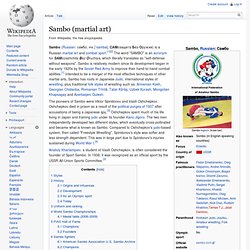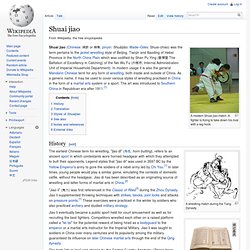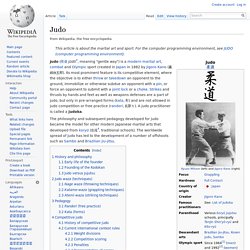

Sambo (martial art) The pioneers of Sambo were Viktor Spiridonov and Vasili Oshchepkov.

Oshchepkov died in prison as a result of the political purges of 1937 after accusations of being a Japanese spy.[3] Oshchepkov spent much of his life living in Japan and training judo under its founder Kano Jigoro. The two men independently developed two different styles, which eventually cross-pollinated and became what is known as Sambo. Compared to Oshchepkov's judo-based system, then called "Freestyle Wrestling", Spiridonov's style was softer and less strength dependent. This was in large part due to Spiridonov's injuries sustained during World War I.[4] Anatoly Kharlampiev, a student of Vasili Oshchepkov, is often considered the founder of Sport Sambo. There are three FIAS recognized competitive sport variations of Sambo (though Sambo techniques and principles can be applied to many other combat sports).[5] Kharlampiev is often called the father of Sambo. All sport practitioners are promoted by 'razryad'. Wrestling. Detail of the wrestling scenes in tomb 15 (Baqet III) at Beni Hasan.

The term wrestling is attested in late Old English, as wræstlunge (glossing palestram).[2] History Wrestling represents one of the oldest forms of combat. Literary references to it occur as early as in the Iliad, in which Homer recounts the Trojan War of the 13th or 12th century BC.[3] The origins of wrestling go back 15,000 years through cave drawings in France. Babylonian and Egyptian reliefs show wrestlers using most of the holds known in the present-day sport. In ancient Greece wrestling occupied a prominent place in legend and literature; wrestling competition, brutal in many aspects, served as the focal sport of the ancient Olympic Games.
During the Middle Ages (fifth century to fifteenth century) wrestling remained popular and enjoyed the patronage of many royal families, including those of France, Japan and England. Mythology Some of the earliest references to wrestling, can be found in wrestling mythology. Modern. Shuai jiao. A modern Shuai jiao match.

A fighter is trying to take down his rival with a leg hook. Shuai jiao (Chinese: 摔跤 or 摔角; pinyin: Shuāijiāo; Wade–Giles: Shuai-chiao) was the term pertains to the jacket wrestling style of Beijing, Tianjin and Baoding of Hebei Province in the North China Plain which was codified by Shan Pu Ying (善撲营 The Battalion of Excellency in Catching) of the Nei Wu Fu (内務府, Internal Administration Unit of Imperial Household Department). In modern usage it is also the general Mandarin Chinese term for any form of wrestling, both inside and outside of China.
As a generic name, it may be used to cover various styles of wrestling practised in China in the form of a martial arts system or a sport. The art was introduced to Southern China in Republican era after 1911.[1] History[edit] A wrestling match during the Tang Dynasty. Jiao li eventually became a public sport held for court amusement as well as for recruiting the best fighters. Judo. History and philosophy[edit] Early life of the founder[edit] The early history of judo is inseparable from its founder, Japanese polymath and educator Jigoro Kano (嘉納 治五郎, Kanō Jigorō?

, 1860–1938), born Shinnosuke Kano (嘉納 新之助, Kanō Shinnosuke?). Kano was born into a relatively affluent family. His father, Jirosaku, was the second son of the head priest of the Shinto Hiyoshi shrine in Shiga Prefecture. Jigoro Kano had an academic upbringing and, from the age of seven, he studied English, Japanese calligraphy (書道, shodō?) Early attempts to find a jujutsu teacher who was willing to take him on met with little success. In 1877, as a student at the Tokyo-Kaisei school (soon to become part of the newly founded Tokyo Imperial University), Kano learned that many jujutsu teachers had been forced to pursue alternative careers, frequently opening Seikotsu-in (整骨院? Founding of the Kodokan[edit] In February 1882, Kano founded a school and dojo at the Eisho-ji (永昌寺?)
Judo versus Jujutsu[edit]